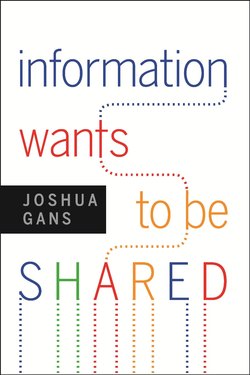Читать книгу Information Wants to Be Shared - Joshua Gans - Страница 4
На сайте Литреса книга снята с продажи.
Preface
ОглавлениеMany in the publishing industry have felt compelled to turn to the written word to describe how digital technologies are affecting their lives. To me, an economist, the range of views seem to go from, “It will all go back to the good old days as people realize what they are missing,” to panic or celebration at the destruction of old institutions. All seem misplaced. This profound transformation is not something for either complacency or intense emotional reactions. The question to me is, have digital technologies really changed anything about supply and demand for writing? It’s become easier to produce (write) and easier to consume (read)—a combination that usually adds up to long-term health. The problem for the industry is that the new ease of reading and writing also eliminated the barriers that had protected it from competition.
What seems to be missing in all of this froth is perspective. There is no recent guidebook to show us how to look at information industries and work out what do to in the face of drastic technological change. As I wrote about these issues, [1] however, a theme kept on cropping up: the technologies seemed to afford opportunities for consumers and creators to share information and to do so without the permission of some gatekeeper. Gatekeepers used to facilitate sharing, but readers became frustrated when gatekeepers asserted rights that prevented sharing. Gatekeepers (in this case, publishers) in the meantime justified such actions as a means of preserving their position before the digital revolution. So, if new digital technology is enabling sharing, I began to wonder if perhaps that was the point all along. In the predigital world, sharing was costly, which obscured just how important it was.
Sharing, as it relates to information these days, is hardly a phenomenon lacking for discussion. Indeed, the whole notion of Web 2.0 or social networks is centered around the idea. Consider Facebook CEO Mark Zuckerberg’s famous 2008 prediction:
I would expect that next year, people will share twice as much information as they share this year, and next year, they will be sharing twice as much as they did the year before. That means that people are using Facebook, and the applications and the ecosystem, more and more. [2]
Consequently, it should be no surprise that Zuckerberg built an entire business around a technology that made sharing easy. And in 2012 his company paid an unprecedented $1 billion for another business (well, really, an app), Instagram, that made sharing even easier. Just as technology entrepreneurs do not seem to have lost money betting on Moore’s Law, I suspect in the future we might say the same about information providers with respect to Zuckerberg’s Law.
But this book is not about Facebook, Web 2.0, or social media. I want to emphasize the oldness in sharing more than make any claim to newness. From this point on, I will refrain from mentioning social at all (until that is, in just one chapter, where I am forced to confront it in evaluating news media). Instead, this is a book about information goods and the business models that can commercialize them.
The style of this book is speculative. I aim to collect myriad thoughts about the information economy and to develop a hypothesis based on a unified theme. The discussion is loose and neither formal nor comprehensive. My goal here is to provoke thought and discussion. Much of what I discuss is theoretical—I’m an economic theorist after all—but that theory has power in dissecting what is going on. Moreover, I can use that theory to crank technological assumptions into the future and make some predictions about what will be valuable and what won’t be.
Many people have contributed to my thinking about these issues. Scott Stern and Fiona Murray, two of my academic coauthors, took me on a journey to understand how and why scientists share knowledge with one another. The Sloan Foundation, whose research program I am codirecting to further investigate this phenomenon, has also been formative. Other collaborators, including Simon Anderson, Susan Athey, and Emilio Calvano, challenged me to think more deeply about advertising associated with information goods. I am grateful to my time at Microsoft Research (New England) in 2011 that provided the genesis for these thoughts. Discussions with Avi Goldfarb and Eric von Hippel have been invaluable. And then, finally, I want to acknowledge my blogging co-collaborators at Digitopoly.org, Erik Brynjolfsson and Shane Greenstein, as well as my Harvard Business Review blog and now this book’s editor, Tim Sullivan, who provided the opportunity to develop key ideas, many of which have carried straight over to the pages here.
1. Both in my academic research (research.joshuagans.com) and on blogs (e.g., digitopoly.org).
2. See http://bits.blogs.nytimes.com/2008/11/06/zuckerbergs-law-of-information-sharing/.
